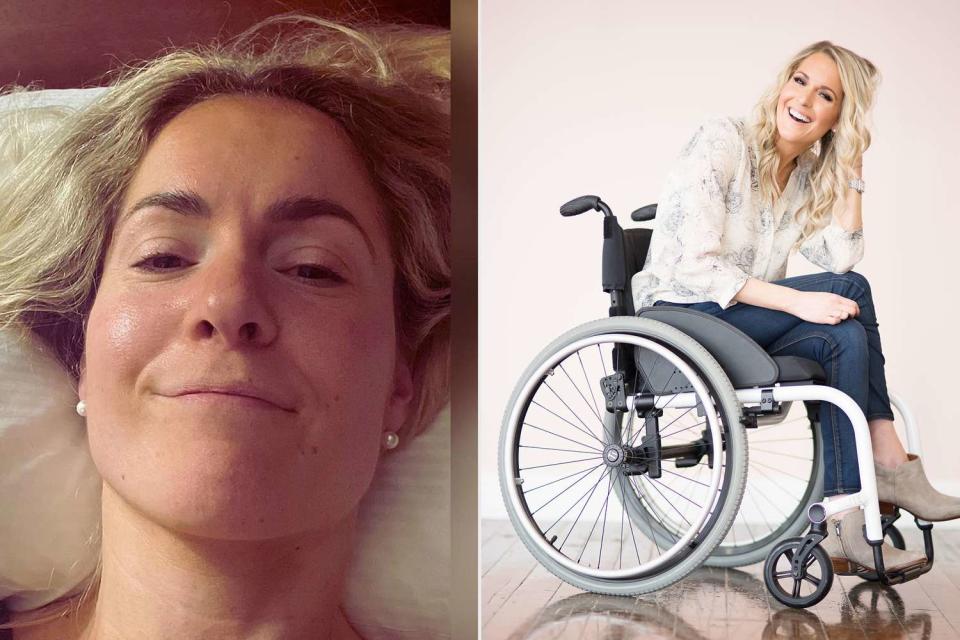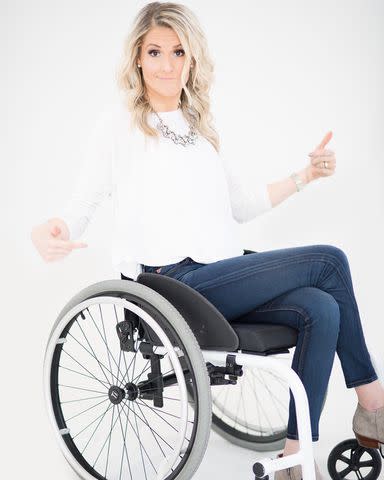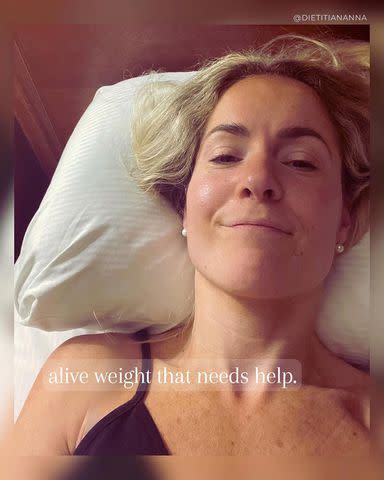Woman with Disability Recalls Being 'Shocked' When Chair Lift Repairman Used the Word 'Deadweight' (Exclusive)
“Disabled humans are humans beyond their disability,” Anna Sweeney tells PEOPLE

Anna Sweeney/Instagram, Rachel Rubin at PARLR
Anna SweeneyA Massachusetts woman is sharing why the word “deadweight” should no longer be used.
Anna Sweeney, a relational nutrition therapist and registered dietitian, was diagnosed with multiple sclerosis (MS) at age 15 and has used mobility aids such as a walker and chair lift for the past seven years. The 37-year-old opened up to PEOPLE about a recent situation that reiterated the importance of language when it comes to speaking about people with disabilities.
Last week, Sweeney was in her Boston home when her chair lift broke in the middle of her stairwell. Luckily, her father lives close by and was able to help her. When a repairman came to fix Sweeney’s chair lift the following day, the man “innocently” mentioned the difficulty of carrying “deadweight,” a term that bothered Sweeney.
“When I heard it, I was a little bit shocked,” she tells PEOPLE exclusively. “I was quiet for a moment. Because he was not speaking about my body. He was speaking about the body of someone else. But that word might be used to describe a future version of my body.”
“Language matters a lot to me and this is a thing I had never thought of before,” adds Sweeney, a certified eating disorder specialist and counselor. “With a little time and settling myself, I did reach out to him to let him know about the importance of the words he uses to describe human bodies. He was very apologetic. Much more than necessary. But I do not believe he will use that expression again, so a win in my book.”
Multiple sclerosis is a disease that affects the central nervous system — the brain and spinal cord — and can cause problems with muscle control and strength, vision, balance, feeling and thinking. Symptoms include: numbness, tremor or lack of coordination. MS differs in each case, with some people going through life with only minor problems and others becoming seriously disabled.

Rachel Rubin at PARLR
Anna SweeneySweeney later shared the story on social media, including the definition of the word, writing, “Deadweight: weight of an inert body hence, ‘a heavy or oppressive burden.’”
“What am I then? A deadweight? Alive but not?” she wrote on Instagram. “Deadweight. An expression that you never need to use again. (Ever.)” She then posted a selfie of herself laying in bed, adding, “Alive weight that needs help.”

Rachel Rubin at PARLR
Anna SweeneyNever miss a story — sign up for PEOPLE's free daily newsletter to stay up-to-date on the best of what PEOPLE has to offer, from celebrity news to compelling human interest stories.
Sweeney tells PEOPLE that as someone with an acquired disability, she’s learning as she goes. She says it’s “critical” that people are more mindful of the language they use when speaking about members of any marginalized community.
“Regarding speaking of humans with disability, in my case physical, it is imperative that we speak first of the human,” she says. “Disabled humans are humans beyond their disability. Members of the disability community represent the largest minority group on the planet.
“Ableism is rampant and everywhere. And every abled person is a human who has yet to acquire disability,” Sweeney continues. “Does that mean everyone will become disabled? Of course not. And learning about this stuff matters for all of us.”
For more People news, make sure to sign up for our newsletter!
Read the original article on People.

